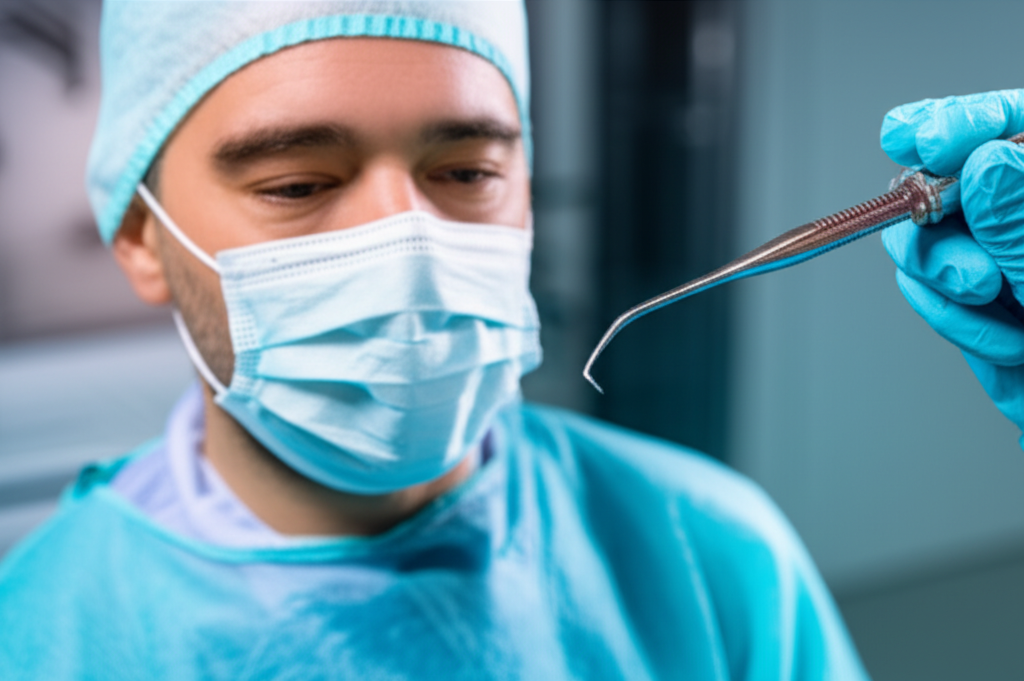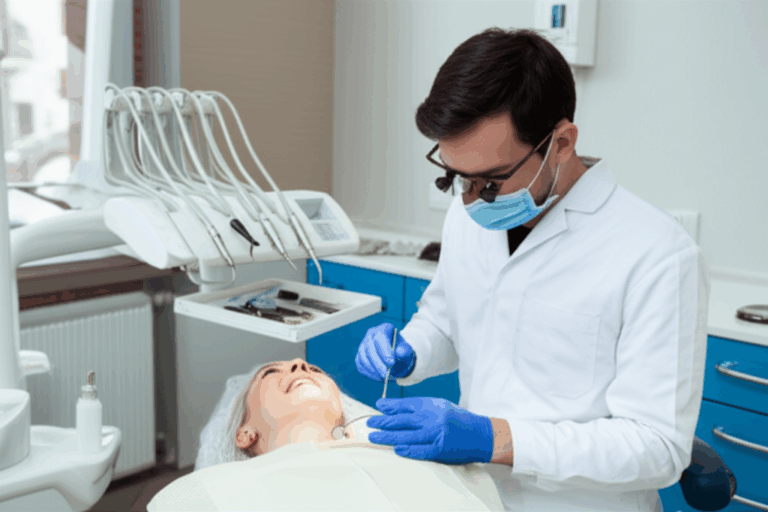
Are Oral Surgeons Dentists, Doctors, or Both? Understanding Their Unique Role in Healthcare
Oral surgeons are the link between teeth and the rest of your face. They start out as dentists. They train like doctors who do surgery. They fix tough problems in the mouth, jaws, and face. This guide helps explain who they are, what they do, and why it matters to you.
I wrote this to answer questions fast. You’ll learn how oral surgeons get their training, what kind of treatments they do, how they put people to sleep for surgery, and when you need to see one. I’ll also show how dentists and labs help in your care.
Table of Contents
What Is an Oral and Maxillofacial Surgeon?
Let’s keep it clear. An Oral and Maxillofacial Surgeon (OMFS) is a dentist who learns more to do special surgeries. They fix sickness, injuries, and problems in the mouth, jaws, face, and neck. Their work happens in offices and hospitals. They also handle pain and anesthesia.
Problem: A lot of people think oral surgeons only pull teeth.
Agitate: That idea means you might wait too long, get scared, or make a wrong choice for your health. You could miss the right expert for jaw pain, a broken bone, or a growth.
Solution: Learn the full job. OMFS covers the mouth, jaws (maxilla and mandible), and the face. They work on bone, teeth, gums, joints, nerves, and problems with breathing too.
You might see other names like “oral surgeon” or “maxillofacial surgeon.” They both mean the same kind of doctor. The American Association of Oral and Maxillofacial Surgeons (AAOMS) uses the full name. Lots of people just say OMFS.
Are Oral Surgeons Dentists, Doctors, or Both?
Short answer: Both. Here’s why.
Every oral surgeon has a dental degree first. That’s either a DDS (Doctor of Dental Surgery) or a DMD (Doctor of Dental Medicine). DDS and DMD mean the same thing. Schools just choose one name or the other. Dentists learn about teeth, mouth, gums, basic repairs, and how to keep your mouth healthy. This first step is important because the mouth is a tricky place.
Next, they learn surgery. These programs last four to six years in hospitals. Some of these programs add in a medical degree (MD). Lots of surgeons do general surgery rounds too. They also spend time in anesthesia, ER, internal medicine, and taking care of very sick patients. They get to see what it’s like to work in the operating and emergency rooms.
So, they start as dentists but work like doctors who do surgery. They fix injuries, infections, growths, and jaw or face problems. You can call them “doctor” for sure.
How Do You Become an Oral Surgeon?
Here are the main steps.
- College degree first
- Dental school for four years (DDS or DMD)
- Extra hospital training in Oral and Maxillofacial Surgery for four to six years
- Some pick a program where they also get an MD
- They can take tests to get board certified by ABOMS
Problem: It’s a long road.
Agitate: People want someone really skilled for hard surgeries. They want someone good for jaw operations, dental implants, wisdom tooth problems, broken jaws, or cancer.
Solution: The long training means lots of skill! OMFS doctors see thousands of cases. They learn removal of teeth, fixing jaws, broken faces, joint problems, sleep problems, cleft lips, mouth tumors, and rebuilding the face.
They also get really good at anesthesia—giving numbing shots, laughing gas, pills, IV sedation, and full sleep. They get special cards for basic and advanced life support. They have legal rights to give strong pain medicine. Every year they do extra courses to stay up-to-date.
OMFS can work in private clinics, colleges, hospitals, or VA hospitals. Many teach other students and doctors.
Do Oral Surgeons Go to Medical School?
Some do. Some don’t. Here’s how it works.
- Most programs take four to six years after dental school
- A lot of four-year programs don’t give an MD
- Some six-year programs include two years of medical school and give an MD too
- Every OMFS spends time working in medicine, even if they don’t get the MD
Is every oral surgeon an MD? Sometimes yes, but not always. Is an oral surgeon who doesn’t have an MD a “doctor?” Yes! Their DDS or DMD is a doctor degree. Their license, long training, and hospital work is what matters—not just the “MD” label.
Is dentistry part of medicine? When learning and treating patients, medicine and dentistry share a lot: science, anatomy, disease, and drugs. They get separate licenses, but for OMFS, the two mix a lot since these surgeons treat dental and medical problems around the face.
What Do Oral Surgeons Treat and Manage?
Think wide. Mouth, teeth, jaws, and face. OMFS doctors handle:
- Infections like really bad tooth abscesses and big swelling
- Face injuries like broken jaws and cheeks, cuts, and hurt nerves
- Jaw joint issues (TMJ) like aching joints or jaws that get stuck
- Growths like lumps, cysts, tumors, and sores that don’t heal
- Problems with saliva glands
- Helping with sleep apnea surgery for some patients
- Birth defects like cleft lip or palate
- Jaw troubles that need fixing for biting or breathing
- Tooth and bone things like hard tooth removals, implant planning, bone adding, or gum grafts
- Trouble in the mouth and jaws that needs x-rays and scans
Problem: You might not know who to call for jaw pain or a face injury.
Agitate: Waiting can make swelling worse or risk your airway.
Solution: Call your regular dentist first. If it’s tough, they’ll send you to an oral surgeon. For big injuries or swelling, go straight to the ER—oral surgeons work there too.
Oral Surgeon vs General Dentist vs ENT vs Plastic Surgeon
Here’s how their jobs are different.
- General Dentist: Your go-to tooth doctor. They clean, check, fix, fill, crown, do easy tooth pulls, and root canals. They keep your mouth healthy and spot problems early.
- Oral and Maxillofacial Surgeon: Surgery expert for teeth, jaws, and face. They do tough tooth removals, put in dental implants, add bone, fix jaw position, fix face breaks, joint surgery, take out lumps, help with cleft lips, and some face cosmetic work.
- ENT (Ear, Nose, Throat) and Plastic Surgeon: These are medical doctors. ENTs focus on the ears, nose, throat, and related places. Plastic surgeons fix soft tissue and how the face looks. These doctors may help with face injuries, tumors, or fixing things up after surgery. They often work with oral surgeons.
Are periodontists doctors? Yes—they finish dental school and a gum specialty. They do gum and bone work. Are orthodontists doctors? Yes—they finish dental school and straighten teeth and jaws. Endodontists do root canals. Prosthodontists make and fix new teeth (crowns, bridges, fake teeth). Pediatric dentists see kids. Oral medicine doctors help with mouth conditions that don’t need surgery. Dental anesthesiologists focus on helping patients relax or sleep through dental work. OMFS do the surgery part for mouth and face.
Common Procedures Oral Surgeons Perform
Here are the big ones:
- Wisdom tooth removal. Most are stuck or sideways, so OMFS handle the hard cases
- Dental implants. They place the implants, add bone if needed, and get everything ready for fake teeth
- Jaw surgery (orthognathic surgery). This fixes bites, pain, speech, or breathing issues
- Fixing broken faces. They treat jaw, cheek, and eye socket breaks. They stitch up face wounds
- Joint (TMJ) care. Splints, shots, little cameras, or open surgery if needed
- Looking at weird lumps, bumps, or sores—taking samples or removing them
- Helping with cleft lips and palates
- Surgery for sleep apnea if your doctor says it can help
- Some do face beauty surgery around the mouth and jaw
They also fix hurt nerves or bad infections that spread. They handle surgery for hard tooth removals or gum procedures.
Anesthesia, Hospital Privileges, and Safety
This makes OMFS special in dentistry. They learn more about sleep and numbing for dental surgery than anyone.
They’re allowed to use numbing shots, laughing gas, pills, IV sedation, and, in most places, full sleep (general anesthesia). They do lots of hours working in anesthesia. They’re careful about airways. They use hospital-grade machines to watch your heart, breathing, and blood pressure. Safety is a big deal.
OMFS can work in hospitals. They can admit you, help ER doctors, and operate in the OR. State dental boards give licenses. Some double-degree surgeons have medical licenses too. They keep their BLS and ACLS training fresh. They carry DEA licenses for medicines. Every year, they do more classes to learn the newest things.
Problem: You’re scared of being “put to sleep.”
Agitate: Worry makes you wait, which can make pain or infection worse.
Solution: Ask your surgeon how much training they have for anesthesia and emergencies. Ask what backup plans they have. Good doctors will answer your questions, plain and simple.
When Should You See an Oral Surgeon?
Here are signs it’s time:
- Stuck wisdom teeth or tough extractions
- Implants or need bone added
- Jaw pain that won’t go away
- Your bite feels off; your jaw looks crooked
- You got an injury to your face
- You see a lump, bump, or sore that stays
- You feel swelling or can’t open your mouth
- Your sleep doctor shows surgery may help
- Your child has a cleft lip or needs jaw help
Ask your dentist for a referral. Orthodontists and doctors can send you too. For big pain, swelling, or injuries, head to the ER.
How to Choose a Qualified Oral Surgeon
Check this list:
- Board Certified: Look for ABOMS on their info
- Education: DDS or DMD and OMFS residency. Some have MD too
- Hospital Privileges: This means hospitals trust and checked them
- Experience: Ask if they’ve done your procedure before
- Safety: Ask about their permits, training, and emergency equipment
- Memberships: Groups like AAOMS and ADA mean they keep learning
- Reviews: Ask your dentist and see what others say
You can ask about ongoing classes, insurance, and how they handle tough cases. A good OMFS will happily answer.
Costs, Insurance, and Referrals
Cost depends on what you need and where you live. Wisdom tooth pulls cost less than big jaw surgeries. Implants cost more if you need bone or extra steps. Insurance might pay for injuries, infections, and some jaw procedures. Dental insurance might pay for extractions or part of the implant fee. Medical insurance may cover injuries, lumps, or sleep apnea fixes.
Problem: Bills make people stressed.
Agitate: You might wait or skip care, which often costs more in the long run.
Solution: Ask for a simple treatment plan and clear cost estimate. Find out if your medical or dental insurance helps. Ask if you can pay over time. Knowing your options makes things less scary.
How Dentists and Labs Team Up With Surgeons to Help You
Great care is a group job. Dentists, braces doctors, and OMFS plan together. They use digital pictures, 3D scans, and tools for spot-on surgery. Then labs make the fake teeth.
- For implants, surgeons put in the base and fix the bone. Later your dentist and lab make your new teeth. A good implant dental laboratory will help you get guides for surgery, custom parts, and strong results.
- For crowns or bridges after surgery, your dentist works with a skilled crown and bridge lab to make solid, good-looking teeth that fit right.
- Teams now use fast digital dental labs for 3D scans and printed guides and teeth, which saves time.
- 3D-printing also helps make models or jaw guides for big jaw surgeries.
Behind the scenes, assistants help keep things clean, and hygienists help you care for your mouth before and after surgery. Good teams make your treatment smooth.
Quick Q&A: DDS vs DMD vs MD and Other Titles
- What’s DDS vs DMD? Both are dentist degrees. Just different names.
- What’s MD vs DDS? MD is a doctor of medicine. DDS is a doctor of dental surgery. Some oral surgeons have both.
- Is DDS a physician? No—they are dentists, not medical doctors.
- Is dentistry medicine? They share science classes and care, but have separate licenses. OMFS mix both.
- Do oral surgeons pull wisdom teeth? Yes—simple and tough ones.
- Can oral surgeons give medicine? Yes—like antibiotics and painkillers, as needed.
- Do oral surgeons work in hospitals? Yes—many do.
- Who helps with jaw pain? Start with a regular dentist. If needed, see OMFS.
- Who does jaw surgery? Oral and maxillofacial surgeons.
- Who handles face injuries? OMFS, ENT, or plastic surgeons, based on the case.
- What’s the difference: endodontist vs OMFS? Endodontists do root canals; OMFS does surgeries.
- How about periodontist vs OMFS? Periodontists do gum and bone around teeth. OMFS does bigger bone, teeth, and face surgeries.
- Prosthodontist vs OMFS? Prosthodontists make new teeth for you. OMFS does surgeries and puts in implants.
- Oral medicine vs OMFS? Oral medicine helps mouth problems that don’t need surgery. OMFS does surgeries.
- Oral pathology vs OMFS? Pathologists check disease under a microscope. OMFS treats in real life.
- Oral radiology vs OMFS? Radiologists look at scans. OMFS reads scans too but also treats patients.
Comparison Table: Who Does What?
| Feature | General Dentist | Oral & Maxillofacial Surgeon (OMFS) | Medical Doctor (ENT/Plastic/General Surgeon) |
|---|---|---|---|
| Main Schooling | DDS or DMD | DDS/DMD ± MD | MD or DO |
| Years After College | 4 years | 4 years dental + 4–6 years OMFS (maybe 8+ with MD) | 4 years med + 3–7+ years after |
| What They Do | Care, checks, repairs, cleaning, easy pulls, root canals | Surgery for teeth, face, jaws, bone, trauma, joint, growths, clefts, reconstruction | Body or face issues, depends on specialty |
| Anesthesia | Numbing, laughing gas, pills (rules vary) | Numbing, laughing gas, pills, IV, full sleep | Numbing, plus full sleep with anesthesiologist |
| Hospital Work | Not usual | Pretty common | Common |
| Special Boards | Boards for each type | ABOMS | Boards for each type |
| How They Get Patients | See anyone | See people sent by dentist, ER, doctors | Sent from family doctor, ER, or other doctors |
Degrees, Licenses, and Safety: A Quick Table
| Name | What It Does | Why It’s Needed |
|---|---|---|
| DDS/DMD | Dental degree | Know the mouth and teeth |
| OMFS Residency | 4–6 years in hospitals | Real hands-on surgery work |
| MD (optional) | Medical degree | Adds more on medicine |
| ABOMS | Board test | Shows they know their stuff |
| BLS/ACLS | Trauma training | Stay safe with emergencies |
| DEA License | Medicine permit | For pain and calming drugs |
| Hospital Rights | Allowed to operate | Can work in hospitals |
| Extra Courses | Always learning | Stay up-to-date |
PAS in Action: Solving Real Problems
- Problem: Tough wisdom teeth, jaw is swollen.
- Agitate: Infection might spread. More pain. Miss work or school.
- Solution: OMFS can pull the teeth, drain infection, and give you safe sedation.
- Problem: Your jaw hurts and bite feels wrong.
- Agitate: Hard to eat, sleep is bad, jaw getting worse.
- Solution: OMFS and orthodontist work on jaw surgery to fix how teeth fit and lessen pain.
- Problem: You lost bone, need implants.
- Agitate: Dentures are loose, hard to eat, not confident.
- Solution: OMFS adds bone and gives implants. Then, dentist and lab finish with strong, nice-looking teeth.
Conclusion: The Dual Expertise That Serves You Best
Oral and Maxillofacial Surgeons start as dentists, then learn surgery like doctors. They work on teeth, jaws, face, and neck. They handle injuries, infections, tumors, TMJ, clefts, sleep problems, and much more. They keep you safe with anesthesia and work in hospitals too. They team up with dentists and trusted labs for the best care.
They’re dentists, doctors, and surgeons in one. They link dentistry and medicine. When you need hard mouth or jaw help, you want that expert on your side.
Summary: Key Takeaways
- Oral surgeons start as dentists, then do extra hospital training.
- Surgery training takes four to six years.
- Some also get a medical degree (MD).
- They fix things in the mouth, jaws, face, and neck.
- They use numbing, IV, and full sleep anesthesia.
- Look for ABOMS, AAOMS, hospital rights, and real experience.
- Your regular dentist is your first helper and planner.
- Small and big teams—surgeons, dentists, and labs—work together.
- Ask about safety, cost, and what to expect.
- Pick the right doctor for the right job.
References
- American Association of Oral and Maxillofacial Surgeons (AAOMS). Scope, training, and patient guides. https://www.aaoms.org
- American Board of Oral and Maxillofacial Surgery (ABOMS). Board certification standards. https://www.aboms.org
- American Dental Association (ADA). Dental specialties and education. https://www.ada.org
- American Medical Association (AMA). Medical education and licensure overview. https://www.ama-assn.org
- Topics: Orthognathic surgery, dental implants, TMJ disorders, sedation safety. AAOMS Clinical Resources and Position Papers.







